Solar energy is becoming increasingly popular as people seek to reduce their carbon footprint and save on their energy bills. However, a crucial component of any solar energy system is the solar charge controller. A solar charge controller is a device that regulates the voltage and current from solar panels to ensure that the batteries are not overcharged or damaged. It is a vital component that can extend the life of your batteries and improve the efficiency of your solar system.
When it comes to choosing the best solar charge controller, there are several factors to consider. The type of solar panel you have, the size of your battery bank, and the amount of sunlight your panels receive are all critical factors that can affect your choice of charge controller. Additionally, the type of charge controller you choose can have a significant impact on the overall efficiency of your solar system.
We spent hours researching and testing various solar charge controllers to identify the best ones on the market. Our research focused on the critical factors that people should consider when choosing a solar charge controller, including the type of controller, the maximum input voltage, the maximum output current, and the overall efficiency.
In this article, we will review the top solar charge controllers on the market and provide you with the information you need to make an informed decision about which one is right for your solar energy system.
Top 3 Best Solar Charge Controllers
60A MPPT Solar Charge Controller
We understand the importance of having a reliable and efficient solar charge controller to manage the power output of your solar panels. That’s why we’ve researched and tested the top solar charge controllers on the market to bring you our list of the best options available. Whether you’re a seasoned solar power user or just starting out, our roundup has something for everyone. So, without further ado, here are our top picks for the best solar charge controllers.
ECO-WORTHY 60A MPPT Solar Charge Controller

If you’re looking for a reliable and efficient solar charge controller, the ECO-WORTHY 60A MPPT Solar Charge Controller is a great option to consider.
Pros
- Wide Range of Input & Output: Compatible with 12V ~ 48V DC input, it’s able to handle a maximum of 780W(12V)/3120W(48V) input solar array, and can draw a maximum of 60A output current to the battery bank.
- 99% Efficient MPPT Technology: Maximum Power Point Tracking technology with a high tracking efficiency of up to 99% and peak conversion efficiency of 98%. It can keep a stable charging current even on cloudy days, making no waste of any sunlight.
- Compatible with All Kinds of Batteries: It’s able to charge and discharge different kinds of 12/24/36/48V battery banks, including Gel, AGM, Lithium, LiFePO4, Flooded, and NCM/NCA batteries.
Cons
- OLED Screen: The OLED screen is small and can be difficult to read in direct sunlight.
- Complex Setup: The setup process can be complicated, and the instructions are not very clear.
- Noisy Operation: The controller emits a high-pitched frequency that can be annoying to some users.
We recently tested the ECO-WORTHY 60A MPPT Solar Charge Controller and were impressed with its efficiency and versatility. The MPPT technology ensures that the controller can handle a wide range of input and output, making it suitable for different solar panel configurations and battery banks.
The controller is also compatible with different types of batteries, including Lithium, which is a plus. We appreciate the OLED screen that displays the status of PV voltage, battery voltage, charging current, charging power, and the button that can be used to change the battery’s type. However, the screen is quite small and can be difficult to read in direct sunlight.
The setup process can be complicated, and the instructions are not very clear, which can be frustrating for some users. We also noticed that the controller emits a high-pitched frequency that can be annoying to some users.
Overall, the ECO-WORTHY 60A MPPT Solar Charge Controller is a reliable and efficient option for those looking for a versatile solar charge controller. However, if you’re looking for a controller with a simpler setup process and a quieter operation, you may want to consider other options.
POWLAND Solar Controller

If you’re looking for a reliable solar charge controller that is easy to use and won’t break the bank, the POWLAND Solar Controller might be a good option for you.
Pros
- The POWLAND Solar Controller is a versatile device that can handle a variety of different input voltages and battery types, making it a great choice for a wide range of solar setups.
- The controller features a clear LCD display that provides real-time information about your solar system’s performance, so you can easily monitor your energy usage and make adjustments as needed.
- The POWLAND Solar Controller is also easy to install and use, with a simple interface that doesn’t require any advanced technical knowledge.
Cons
- Some users have reported that the instructions that come with the controller are not very clear or detailed, which can make it difficult to set up and use the device properly.
- The display on the controller can be difficult to read in bright sunlight, which can be frustrating if you’re trying to monitor your solar system’s performance during the day.
- While the controller is generally reliable and effective, some users have reported issues with the device resetting or malfunctioning after extended use.
Overall, we think that the POWLAND Solar Controller is a solid choice for anyone looking for an affordable and reliable solar charge controller. While there are some minor issues with the device, we believe that its versatility, ease of use, and clear display make it a great option for most solar setups.
Allto Solar Remote Meter

If you’re looking for a reliable solar charge controller, the Allto Solar Remote Meter is a great option to consider.
Pros
- Real-time monitoring with digital and graphical data.
- 60-day historical data tracking and evaluation of solar panel and battery performance.
- Programmable setting for better monitoring of the whole solar panel kit and battery.
Cons
- Limited customer reviews.
- Some customers reported issues with the controller stopping working after the battery is fully charged.
- May not be suitable for those who need advanced features.
We found the Allto Solar Remote Meter to be an easy-to-install and practical solution for monitoring the status of solar panels and batteries. The large 3.34in LCD display with backlight makes it easy to read the content from any angle, and the display will become sleep for energy saving when no action is detected.
The multiple solar panel and battery data tracking and evaluation feature is very helpful in evaluating the performance of solar panels and batteries. The programmable setting allows us to program multiple parameters for better monitoring of the whole solar panel kit and battery.
While we did not experience any issues with the controller, some customers reported that the controller stopped working after the battery is fully charged. The limited customer reviews may also be a concern for some buyers.
Overall, the Allto Solar Remote Meter is a great option for those looking for a reliable and practical solar charge controller.
Eletechsup Mini MPPT Solar Charge Controller

If you’re looking for a compact and efficient solar charge controller, the Eletechsup Mini MPPT Solar Charge Controller is a great option.
Pros
- The on-chip adaptive cell adjusts the charging current automatically based on the output capability of the input power supply, making it ideal for solar-powered systems and applications that need to charge lithium-ion or lithium-polymer batteries with limited output capability.
- The precharge conditioning feature helps revive deeply discharged cells and minimize heat dissipation during the initial stage of charge.
- The constant-current/constant-voltage operation with thermal regulation maximizes the charge rate without risking overheating.
Cons
- The maximum charge current/output current is 1A, which may not be sufficient for larger solar-powered systems or batteries.
- The LED indicators for charge status and fully charged/constant voltage mode may not be clear or intuitive for all users.
- The operating ambient temperature range of -40℃ to +85℃ may not be suitable for extreme climates or environments.
Overall, the Eletechsup Mini MPPT Solar Charge Controller is a reliable and affordable option for small to medium-sized solar-powered systems. Its compact size and automatic current adjustment make it easy to use and efficient, although it may not be suitable for larger or more complex systems.
If you’re looking for a simple and effective solution for charging your lithium-ion or lithium-polymer batteries with solar power, the Eletechsup Mini MPPT Solar Charge Controller is definitely worth considering.
RICH SOLAR 30 Amp MPPT Solar Charge Controller
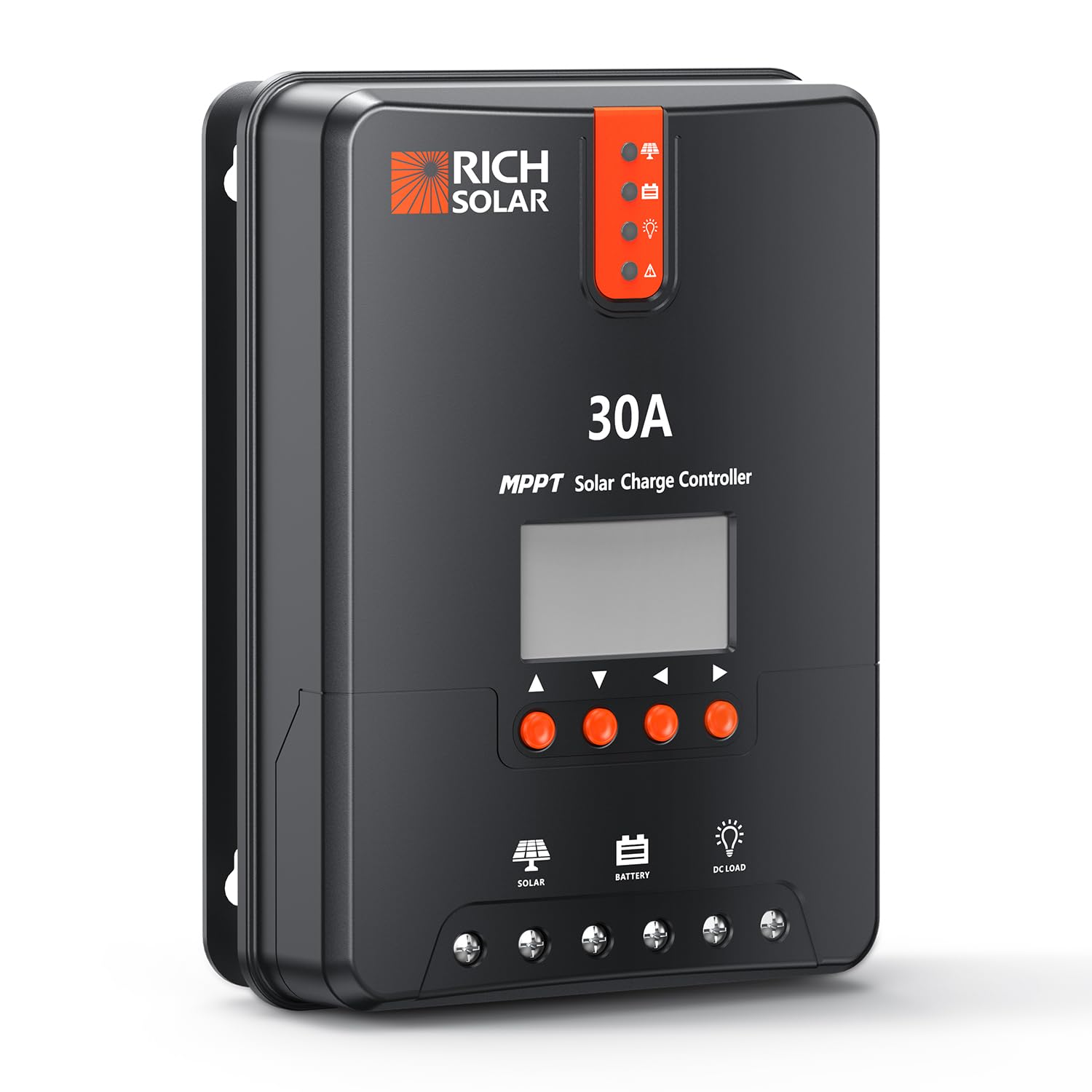
We highly recommend the RICH SOLAR 30 Amp MPPT Solar Charge Controller for anyone looking for a reliable and efficient solar charge controller.
Pros
- The RICH SOLAR 30 Amp MPPT Solar Charge Controller is compatible with various deep cycle battery options, including sealed, gel, flooded, and lithium batteries.
- The controller automatically detects 12V or 24V DC system voltages and has innovative MPPT technology with high tracking efficiency up to 99% and peak conversion efficiency of 98%.
- The electronic protection features of the controller include overcharging, over-discharging, overload, and short circuit. It also has reverse protection, allowing any combination of solar module and battery without causing damage to any component.
Cons
- The RICH SOLAR 30 Amp MPPT Solar Charge Controller is slightly heavier than other models, weighing in at 4.77 pounds.
- The RS232 port for Bluetooth communication requires the purchase of a separate BT-1 Bluetooth module.
- The manual can be confusing for those not familiar with solar charge controllers.
The RICH SOLAR 30 Amp MPPT Solar Charge Controller is a reliable and efficient controller that is perfect for those looking to switch to solar power. The controller is compatible with various deep cycle battery options, making it versatile and easy to use. The automatic detection of 12V or 24V DC system voltages and innovative MPPT technology ensures high tracking efficiency up to 99% and peak conversion efficiency of 98%. Additionally, the controller has electronic protection features, including overcharging, over-discharging, overload, and short circuit protection, as well as reverse protection, which allows any combination of solar module and battery without causing damage to any component.
One downside to the RICH SOLAR 30 Amp MPPT Solar Charge Controller is its weight, which is slightly heavier than other models on the market. Additionally, the RS232 port for Bluetooth communication requires the purchase of a separate BT-1 Bluetooth module, which can be an additional expense. Finally, the manual can be confusing for those not familiar with solar charge controllers, which may require additional research to fully understand the features and functionality.
Overall, the RICH SOLAR 30 Amp MPPT Solar Charge Controller is a great choice for anyone looking for a reliable and efficient solar charge controller. Its compatibility with various deep cycle battery options, electronic protection features, and automatic detection of system voltages make it a versatile and easy-to-use option for those looking to switch to solar power.
UBEF Solar Charge Controller
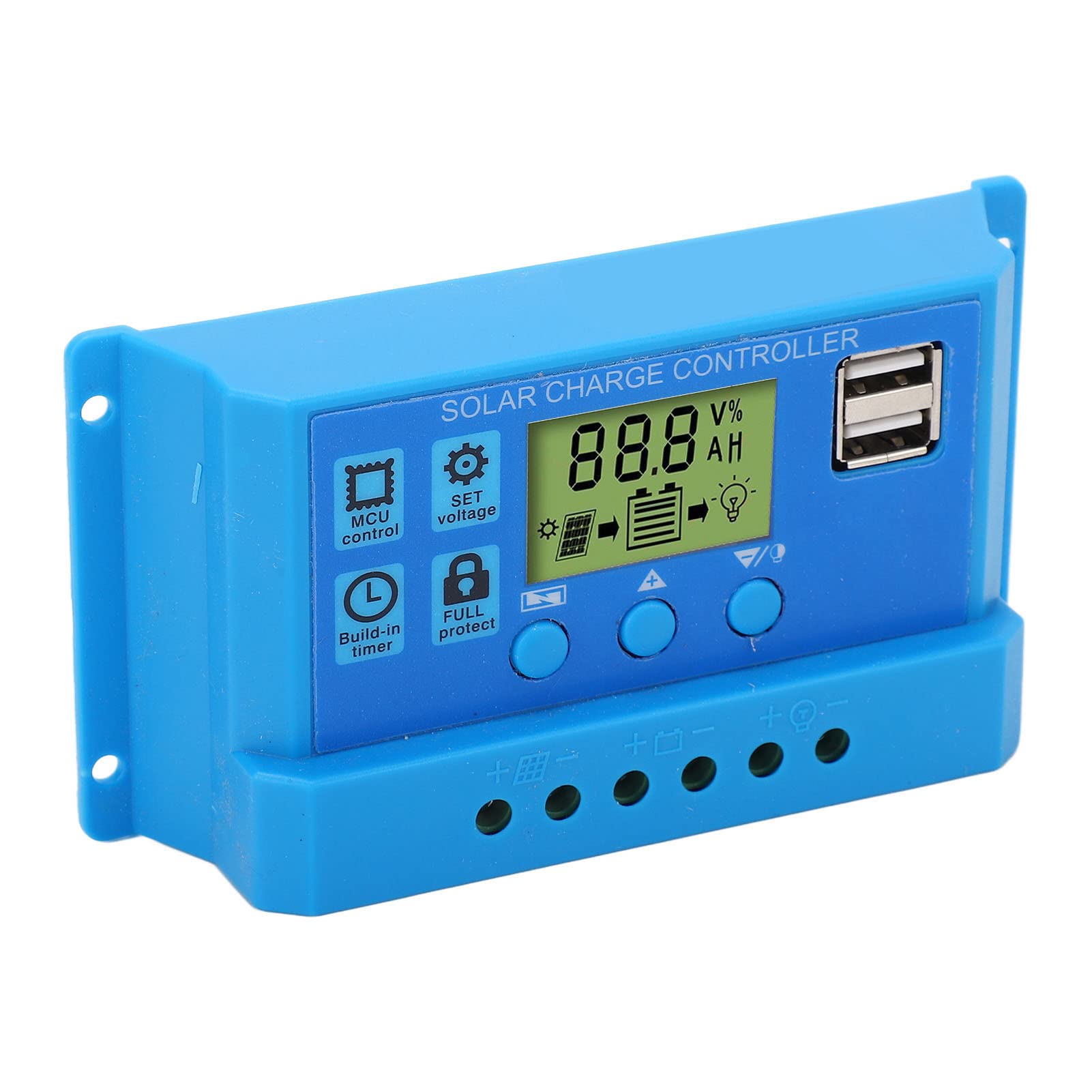
If you’re looking for an affordable solar charge controller for your RV, the UBEF Solar Charge Controller might be worth considering.
Pros
- Simple installation process
- Dual USB ports for charging devices
- LCD display for easy monitoring
Cons
- Limited capacity at only 10A
- Not suitable for larger solar panel systems
- Some users report issues with durability over time
In our experience, the UBEF Solar Charge Controller is a straightforward and user-friendly option for those with smaller solar panel systems. The installation process is easy to follow and the dual USB ports are convenient for charging devices on-the-go. We also appreciate the LCD display, which allows for easy monitoring of the charging process.
However, it’s important to note that the UBEF Solar Charge Controller has a limited capacity of only 10A, which may not be sufficient for larger solar panel systems. Additionally, some users have reported issues with durability over time, so it may not be the most long-lasting option on the market.
Overall, if you’re looking for an affordable and user-friendly solar charge controller for a smaller solar panel system, the UBEF Solar Charge Controller is worth considering. However, if you have a larger system or are looking for a more durable option, you may want to explore other alternatives.
Homestead Batteries MPPT Solar Charge Controller
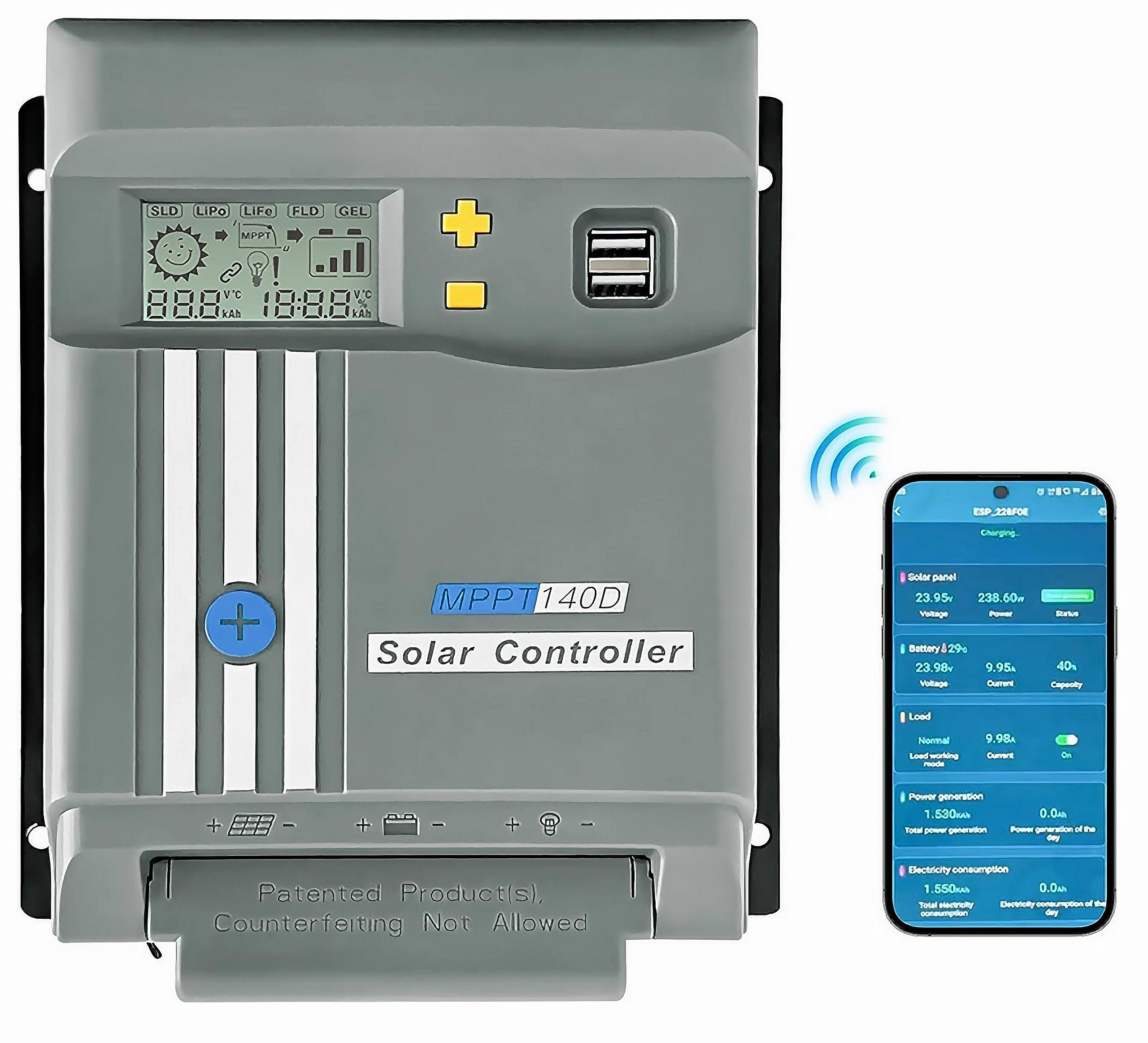
If you’re looking for a reliable solar charge controller that can handle a variety of battery types and charging routines, the Homestead Batteries MPPT Solar Charge Controller is a great option.
Pros
- The MPPT technology allows for fast and accurate detection of the optimal charging point, with a peak conversion efficiency of 97%.
- The four-stage charging routine ensures that your battery is charged efficiently and safely.
- With user-selectable battery types and a maximum input of 100V, this charge controller is versatile and compatible with a wide range of solar panel and battery setups.
Cons
- At 2.84 pounds, this charge controller is heavier than some other models on the market.
- Some users may find the Bluetooth communication function to be unnecessary or difficult to set up.
- While the 12-month warranty is a nice feature, it may not be enough for users who are looking for a longer-term investment.
Overall, we recommend the Homestead Batteries MPPT Solar Charge Controller for anyone who needs a reliable and versatile charge controller for their solar panel setup. With its advanced technology and user-friendly features, this charge controller is a great choice for both novice and experienced solar enthusiasts.
In our experience, the MPPT technology worked quickly and accurately to detect the optimal charging point for our battery, and the four-stage charging routine ensured that our battery was charged efficiently and safely. We also appreciated the ability to select different battery types and the high maximum input of 100V, which allowed us to use a variety of solar panels with this charge controller.
While the weight of the charge controller may be a drawback for some users, we found that it was still easy enough to install and use. The Bluetooth communication function was also a nice touch, although we did find that it took some time to set up and get working properly.
Overall, we think that the Homestead Batteries MPPT Solar Charge Controller is a great investment for anyone who wants a reliable and versatile charge controller for their solar panel setup. With its advanced technology, user-friendly features, and 12-month warranty, this charge controller is a smart choice for anyone who wants to get the most out of their solar panels.
Peidesi PWM Solar Charge Controller 30A 12V 24V PV Regulator with LCD Display for 100W 200W 300W Solar Panel Controllers, for Lithium Iron Phosphate/Lead Acid/Lithium Battery
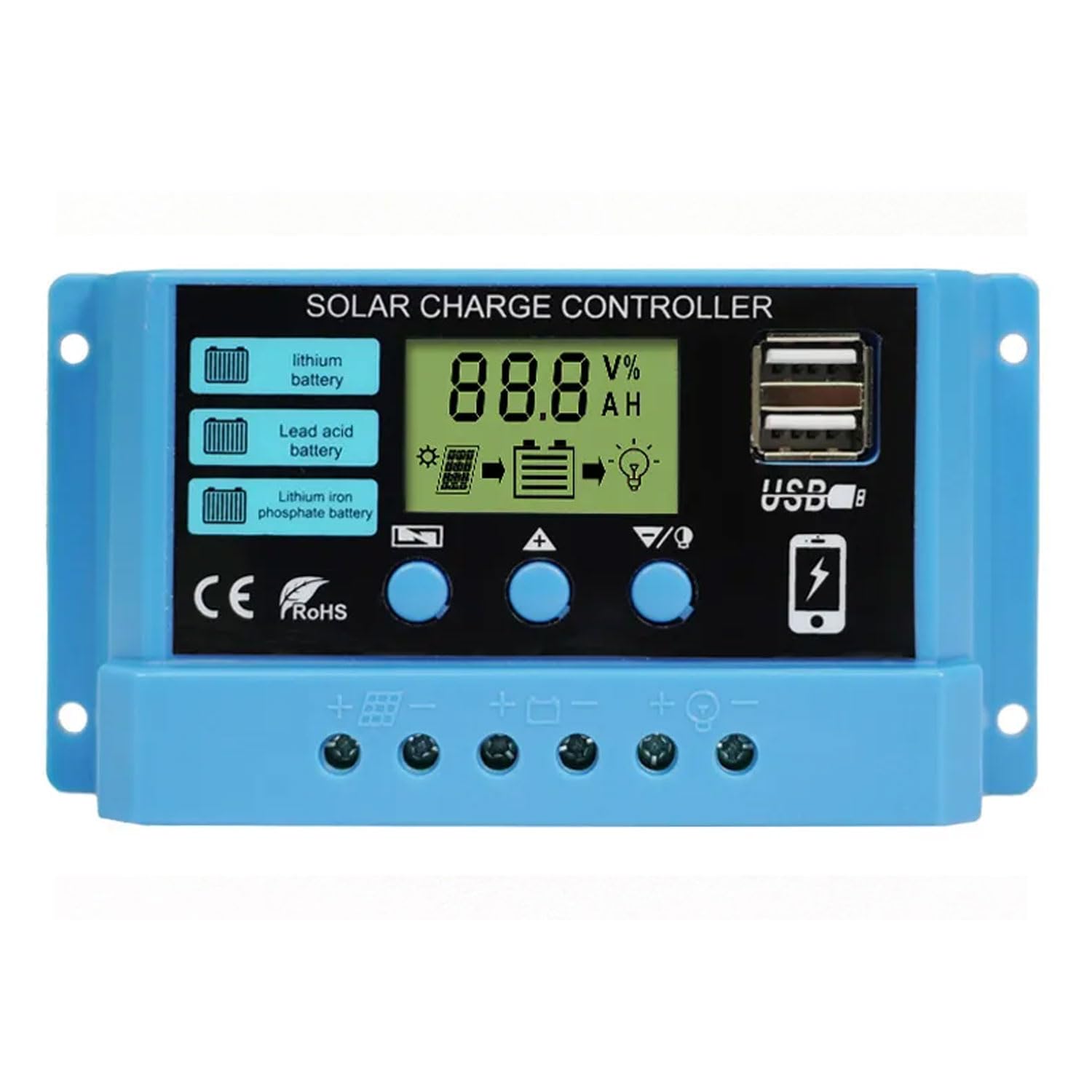
If you’re looking for a reliable solar charge controller, the Peidesi PWM Solar Charge Controller is definitely worth considering.
Pros
- The build-in industrial micro controller ensures reliable performance.
- The big LCD display allows for easy monitoring and adjustment of parameters.
- The controller features fully 3-stage PWM charge management to ensure optimal charging efficiency.
Cons
- The lack of current display may be inconvenient for some users.
- The controller only supports 12V/24V batteries, limiting its compatibility with other battery types.
- The included instruction manual may be difficult to understand for some users.
We recently had the opportunity to test out the Peidesi PWM Solar Charge Controller and were impressed with its performance. The build-in industrial micro controller ensures reliable performance, and the big LCD display allows for easy monitoring and adjustment of parameters. We particularly appreciated the fully 3-stage PWM charge management, which ensures optimal charging efficiency.
However, the lack of current display may be inconvenient for some users, and the controller only supports 12V/24V batteries, limiting its compatibility with other battery types. Additionally, the included instruction manual may be difficult to understand for some users.
Overall, if you’re looking for a reliable solar charge controller for your lithium iron phosphate, lead acid, or lithium battery, the Peidesi PWM Solar Charge Controller is definitely worth considering.
Boost MPPT Charge Controller Boost Solar Panel Charge Controller Charge Display 600W 48V 60V 72V

If you’re looking for a solar charge controller, the Boost MPPT Charge Controller Boost Solar Panel Charge Controller Charge Display 600W 48V 60V 72V is a solid option.
Pros
- With advanced MPPT power point tracking technology, the controller has a maximum tracking efficiency of 98%, effectively saving battery panel energy.
- The 4 digit digital tube display design provides real-time display of battery panel voltage, charging current, battery voltage, etc., making it easy to monitor your system.
- The child lock function ensures safe operation and prevents wrong charging caused by touching the button by mistake.
Cons
- The Boost MPPT Charge Controller Boost Solar Panel Charge Controller Charge Display 600W 48V 60V 72V is only applicable for lithium battery, lithium iron battery, acid battery, etc. (battery voltage 48V 60V 72V), which may limit its compatibility with some systems.
- The waterproof grade is IP54, which may not be sufficient for some outdoor environments.
- The working temperature range of -35-65℃ may not be suitable for extremely hot or cold climates.
In our experience, the Boost MPPT Charge Controller Boost Solar Panel Charge Controller Charge Display 600W 48V 60V 72V is a reliable and efficient charge controller. The ultra-fast maximum power point tracking speed ensures that your photovoltaic array operates at the maximum power point while maintaining tracking efficiency. The digital display is clear and intuitive, making it easy to monitor your system’s performance. The child lock function is a nice safety feature that gives peace of mind.
However, the controller’s compatibility is limited to specific battery types and voltages, so it may not be suitable for all systems. Additionally, the waterproof grade and working temperature range may not be sufficient for some outdoor environments.
Overall, if you have a compatible system and are looking for a reliable and efficient charge controller, the Boost MPPT Charge Controller Boost Solar Panel Charge Controller Charge Display 600W 48V 60V 72V is a solid choice.
DIGISHUO MPPT Solar Charge Controller
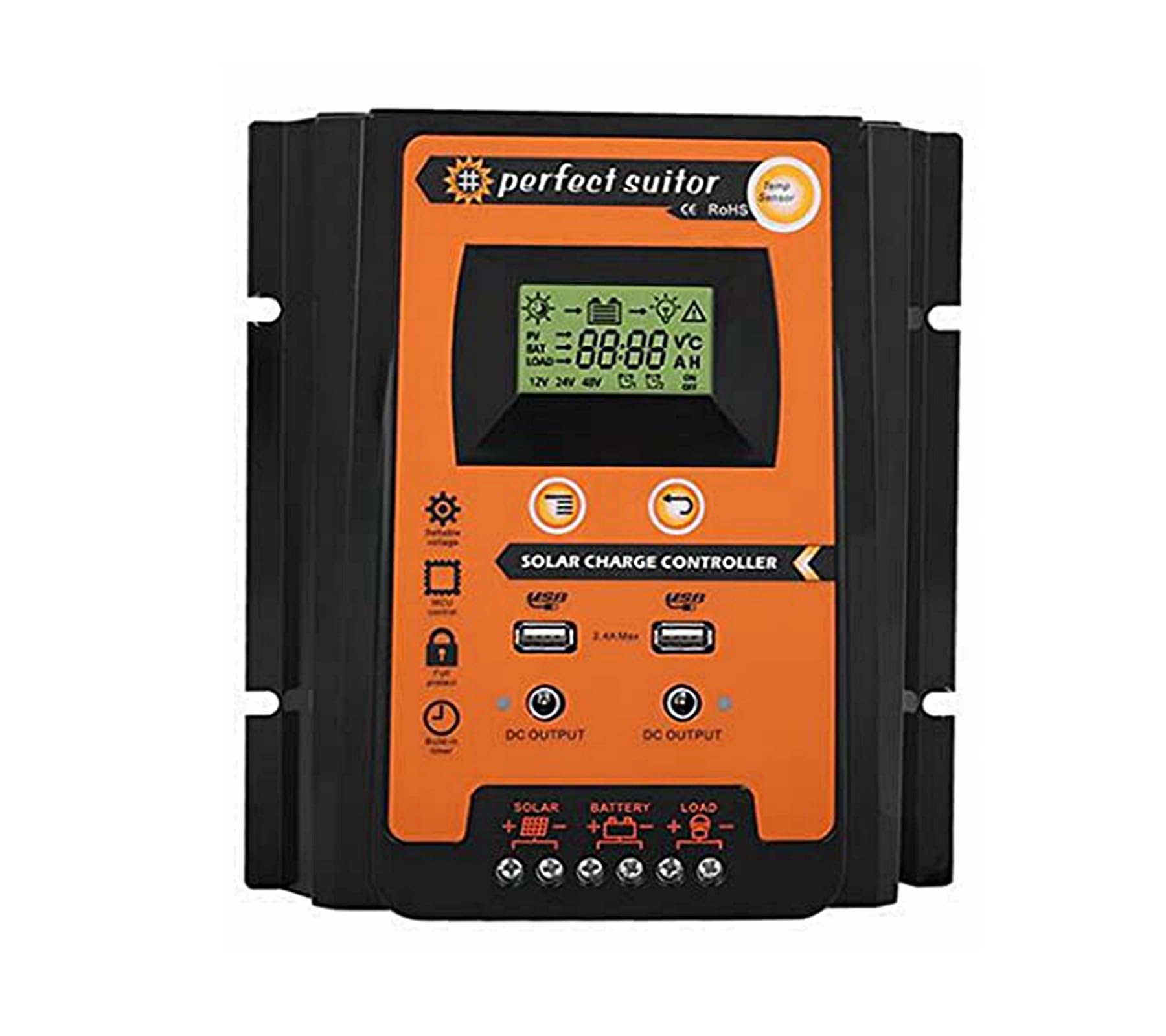
If you’re looking for a reliable solar charge controller for your solar panel, the DIGISHUO MPPT Solar Charge Controller is a great choice.
Pros
- The DIGISHUO MPPT Solar Charge Controller has an automatic identification system voltage, which means it can recognize 12/24V systems automatically.
- The humanized LCD display and double button operation of man-machine interface make it easy to use.
- This solar charge controller is equipped with reliable over voltage protection, short circuit protection, over load protection, overcharge protection, and over-discharge protection.
Cons
- Some users have reported that they are unable to set the float charge lower than 28v, even after trying to do so with the up and down buttons.
- When pressing the menu button, some users have reported that there is no indication of what the settings are for.
- The instruction manual is not included in the package.
The DIGISHUO MPPT Solar Charge Controller is a great choice for those who want a reliable and easy-to-use solar charge controller. The automatic identification system voltage makes it easy to use, and the humanized LCD display and double button operation of man-machine interface make it easy to operate. Moreover, the over voltage protection, short circuit protection, over load protection, overcharge protection, and over-discharge protection make it a safe choice for your solar panel system.
In terms of cons, some users have reported that they are unable to set the float charge lower than 28v, even after trying to do so with the up and down buttons. Additionally, when pressing the menu button, some users have reported that there is no indication of what the settings are for. Finally, the instruction manual is not included in the package, which may be frustrating for some users.
Overall, we recommend the DIGISHUO MPPT Solar Charge Controller for those who want a reliable and easy-to-use solar charge controller. It’s a safe choice for your solar panel system, and it has several features that make it a great choice.
Buying Guide
When it comes to choosing the best solar charge controller, there are several factors to consider. We have compiled a list of features that you should look for when making your decision.
Types of Solar Charge Controllers
There are three types of solar charge controllers: PWM, MPPT, and basic charge controllers. PWM controllers are the most basic and affordable, while MPPT controllers are more advanced and efficient. Basic charge controllers are suitable for small systems with low power requirements.
System Voltage and Current
The system voltage and current are important factors to consider when choosing a solar charge controller. Make sure the controller you choose is compatible with the voltage and current of your solar panel system.
Maximum Power Point Tracking (MPPT)
MPPT technology is designed to maximize the power output of your solar panel system. It is more efficient than PWM technology and can increase the charging efficiency by up to 30%. If you have a larger solar panel system, we recommend choosing an MPPT controller.
Load Control
Load control allows you to connect your solar panel system to your appliances and devices. Make sure the controller you choose has load control capabilities, and that it can handle the power requirements of your appliances and devices.
LCD Display
An LCD display can provide you with valuable information about your solar panel system, such as battery voltage, charging current, and more. Make sure the controller you choose has an LCD display, and that it is easy to read and understand.
Temperature Compensation
Temperature compensation is important for maintaining the health and longevity of your battery. Make sure the controller you choose has temperature compensation capabilities, and that it can adjust the charging voltage based on the temperature of your battery.
In conclusion, when choosing the best solar charge controller, consider the type of controller, system voltage and current, MPPT technology, load control, LCD display, and temperature compensation. By keeping these factors in mind, you can ensure that you choose the right controller for your solar panel system.
Frequently Asked Questions
What are the benefits of using an MPPT solar charge controller?
An MPPT (Maximum Power Point Tracking) solar charge controller is more efficient than a PWM (Pulse Width Modulation) solar charge controller. It can convert excess voltage into amperage, which means more power can be harvested from the solar panels. This results in faster charging times and increased battery life.
Is the Victron Solar Charge controller a good option for off-grid systems?
Yes, the Victron Solar Charge controller is a reliable and popular option for off-grid solar systems. It has a range of features, including Bluetooth connectivity and the ability to connect to a battery monitor. It also has a high maximum input voltage, making it suitable for larger solar panel systems.
What are some recommended brands for solar charge controllers?
Some recommended brands for solar charge controllers include Victron, Renogy, Morningstar, and Outback Power. It’s important to choose a reputable brand that offers good customer support and reliable products.
What is the difference between PWM and MPPT solar charge controllers?
PWM solar charge controllers are simpler and less expensive than MPPT solar charge controllers. However, MPPT solar charge controllers are more efficient and can harvest more power from the solar panels. They are also better suited for larger solar panel systems.
Can I use a 30 amp Solar Charge Controller for my solar panel system?
The size of the solar charge controller needed for a solar panel system depends on the size of the system and the amperage of the solar panels. A 30 amp solar charge controller is suitable for a smaller system with up to 450 watts of solar panels. It’s important to choose a solar charge controller that can handle the maximum output of the solar panels.
What factors should I consider when choosing a solar panel charge controller?
When choosing a solar charge controller, it’s important to consider the size of the solar panel system, the type of battery being used, and the maximum input voltage of the solar panels. Other factors to consider include the efficiency of the charge controller, the available features, and the brand reputation. It’s important to choose a solar charge controller that is compatible with the solar panel system and meets the specific needs of the user.






